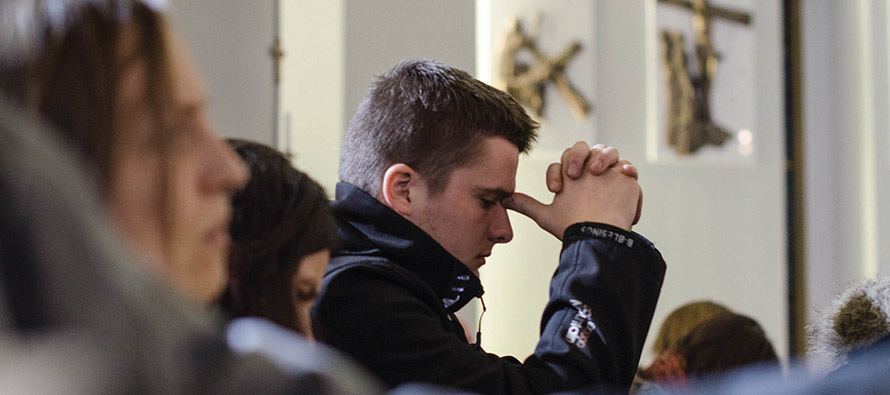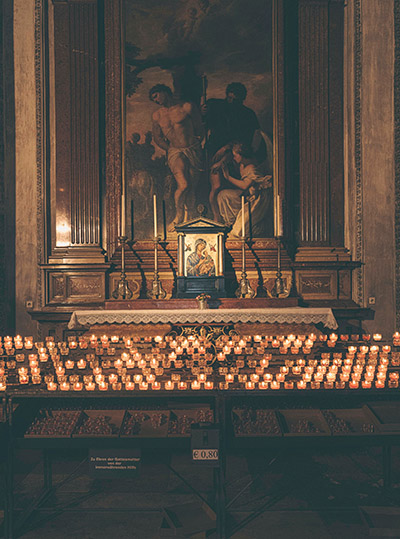Prayer: Our never-ending conversation with God

Prayer of petition is one of the most common forms of prayer. We all have needs, and it is natural to lift them up to God. (Photo: Paulina Krzyżak, Flickr)
I LIVE IN THE HIGH DESERT. At this altitude I’m grateful to have a small, sunny alcove for the wintry months. It’s fitted with a few comfy chairs, house plants, and a small table wide enough to hold a coffee cup, breviary, and rosary. This little space has become my go-to place to pray.
Each morning, I make coffee and head into the alcove. Sometimes I curl up in a chair with my cup for an hour without doing anything observable. Or I may sing psalms from the breviary. I may say a Rosary, dedicating each decade to some group in the world: parents, refugees, leaders. Most mornings I speak aloud the names of friends in need, holding their concerns with tender attention. Visitors have told me I sit there and smile a lot. Inhaling the aroma of coffee, absorbing the sun on my skin, following the promptings of my heart in prayer, there seems rather a lot to smile about. It’s a new day, and I’m part of it.
But one could ask: Why do this? Why take an hour of life each day and apparently throw it out the window? What happens when we pray, exactly? What do we expect God does in response to our entreaties? Does anything really change after prayer?
Prayer is a basic component of life for believers. We pray when we go to Mass, sit down to a meal, or learn that someone we love is in trouble. Some of us have habits of prayer we practice faithfully, morning or evening; when we start the car or begin an important task. Or we may pray on an “as needed” basis—when things aren’t going well, or we feel elated enough by good news to want to high five the Higher Power.
While there are several fundamental moods of prayer—praise, thanksgiving, intercession, lamentation, and confession among them—the most common prayer is one of petition. Petition simply means we have a request to make. Usually it’s very specific. And because we have a person or situation very much in mind as we offer this prayer, we anticipate an outcome that addresses our request. We hope our friend gets the job. We want our aunt to receive promising news from the doctor. We fear violence is brewing and wish it to be averted. We may be struggling to escape a seemingly inescapable circumstance, and seeking a trapdoor of miraculous proportions.
Of course, God is not a gumball machine. We don’t put 25 cents’ worth of prayer into the cosmic exchange and get a quarter’s worth of rescue from the transaction. Our consumer culture makes us prone to this way of thinking. We may also imagine it’s our job in prayer to persuade God to do the right thing—and God’s job to take our advice! We may become frustrated when it seems we did our part, and God didn’t follow through. But if our petition doesn’t purchase some celestial goods, then what’s it for?

God speaks; prayer is our response
Part of our confusion may be in that we tend to view prayer as initiating a conversation—to which we hope God will reply. Prayer is more properly understood as a response. Divine activity in the world comes first. God’s self-revelation is the only reason we know whom to address in this exchange. Therefore prayer doesn’t require a response so much as it IS the response. From Genesis onward, God speaks first. Our efforts at prayer are an attempt to reply.
Theologian Timothy Lenchak identifies five elements of prayer in scripture that describe its meaning. First, prayer is pervasive. It’s not confined to the Book of Psalms but appears everywhere in our sacred history. Adam and Eve talk with God in a familiar way. So does their son Cain, even after killing his brother. Abraham intercedes for doomed Sodom quite boldly. Moses is unafraid to challenge God when he disagrees with the direction the divine plan is going. Military leaders pray for victory in upcoming battles. Prophets pray for (and sometimes against) the communities they represent with a directness that can make us gasp. Prayer is clearly not the privilege of priests and kings. It’s a channel open to anyone, at any time—public or private, in the temple, at home, or in the wilderness. It’s a conversation accessible to the sinner and the sage.
Second, biblical prayer is presented as an obligation. God starts the conversation; a reply is anticipated. How to respond is an open question, whether in gratitude or mourning, praising or venting, asking for what we need or admitting we screwed up. Some daily check-in is the biblical pattern. Consider how Jesus slips off to pray regularly before, during, and to the last evening of his mission on Earth.
Next, prayer is personal. It engages our whole selves and our history. We don’t pray in a vacuum, but rather in the context of our own time and place. Our prayer, therefore, must be honest, expressing who we are and what this hour of our human reality is like. A false or segregated self is nothing to bring to the conversation with someone you trust—God most of all. Jesus models this frankness in the Garden of Gethsemane, when he tells his Father that he’d rather not be handed over to his enemies. If Jesus didn’t say this, he’d be leaving out a vital part of himself and his prayer would be unreal.
In addition, biblical prayer presumes a context of covenant. That is, it’s larger than just you or me. We each enter the conversation with God as members of a faith community. This community has a long history of relationship with God, some of it beautiful and faithful, some of it indifferent or disloyal. Promises were made and many were broken. Our faith community has a story with sacred rituals, laws, and a purpose. Ours is the God of Abraham and Jacob, Isaiah and Mary. We add our names to that list when we come into an attitude of prayer.
Finally, prayer is effective. This may be the hardest part to appreciate, since we often pray and don’t get the results we hope for. Yet consider that, even in the Bible, while the Red Sea does get parted, healings occur, and battles with poor odds are frequently victorious, prayer doesn’t always offer this sort of return on the investment. Abraham is promised a land of his own. The only plot of ground that ever belongs to him is the grave he buys for his wife, Sarah. In the story of the Maccabees, seven faithful sons profess their loyalty to God and refuse to defile that covenant by eating pork. Each one in turn is killed by the enemy. Jesus prays for the cup of suffering to pass him by, but it doesn’t.
It’s that anguished prayer of Jesus in the garden that teaches us what we need to know about prayer of petition. Jesus is honest about what he fears and wants. Yet he prays to align his will with his Father’s as he travels the way opening before him.
This is how we understand prayer to be effective when it clearly doesn’t result in success as we define it. Remember, prayer doesn’t start a conversation but responds to one already in progress. Entering this conversation is an act of confidence in God. In the decision to pray, we are met and are no longer alone with our burdens. Is sharing our truest selves with a close friend a “success,” even if our troubles don’t disappear?
Essential ingredients: honesty, openness
My best friend Erin died last year rather suddenly. She’d felt some abdominal pain and was having trouble breathing, so she went to the emergency room. Erin expected they’d give her a pill and send her home. Instead, she wound up in hospice. When she called me from the hospital, we were both in shock, and prayed for some treatment to be proposed to give her more time. We wanted the tide of this medical crisis to be reversed. Wouldn’t God want the same thing we did? Yet as the hours passed, Erin’s condition worsened. Many of the symptoms couldn’t be resolved. If she lived—a marginal possibility—the life returned to her would be one of great suffering.
A week into the crisis, Erin asked that we stop praying for her recovery. She wanted to pray that she’d know how to die and do it well. Our petition changed as we understood the situation more deeply. We wouldn’t pray for an outcome that could never be. Rather, we prayed with the situation so that Erin would confidently place herself in God’s merciful hands.
Traveling a holy path through life means walking with God, wherever the road takes us. The more we trust that God has got us, the more we appreciate that every prayer we pray is a success. Each day is a new day. Your prayer makes you fully part of it.
Related articles: VocationNetwork.org, “Listen closely” and “Ask God a question, you’ll get an answer.”
Tags
Related
- Questions Catholics Ask
- What Catholics believe about the Eucharist
- How Jesus embraced his call
- What the church is teaching—and learning—about the sin of racism
- Church defined: Jesus calls; we respond
- A Creed to believe in
- On whose authority?
- Ten great things about being Catholic
- Following Jesus: Be ready for some surprises
- Enter into the divine Read More
Most Viewed
- Find your spirituality type quiz
- Questions and answers about religious vocations
- Celibacy quiz: Could I be a nun? Could I be a brother? Could I be a priest?
- Resources for older discerners or those with physical and developmental differences
- About Vocation Network and VISION Guide


